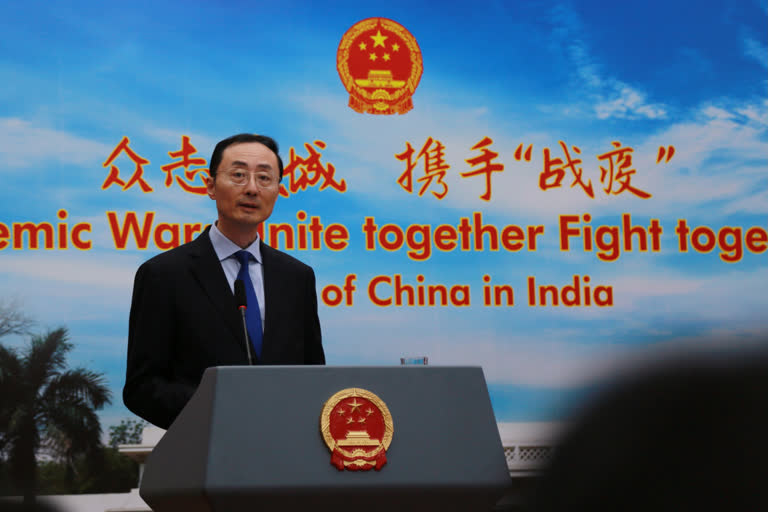Hyderabad: Chinese Ambassador in New Delhi Sun Weidong hopes that India will review its travel and trade advisory issued for its nationals in wake of the Coronavirus epidemic outbreak.
Interacting with media at the embassy today the Ambassador asked India to review its restrictions in 'objective, rational and calm manner' and 'implement the consensus of the two leaders (Prime Minister Modi and President Xi Jinping)' by handling China's requirement for 'much needed' medical supplies in a 'humanitarian manner'.
"The WHO (World Health Organisation) has repeatedly not recommended and even opposed any travel and trade restrictions. We should follow the WHO's professional advice. Countries around the world need to maintain normal flows of people and trade, and refrain from overreaction," said Ambassador Sun.
He also appreciated New Delhi’s offer of medical help and assured that all Indian citizens in the worst affected provinces of China are being taken care of.
"China and India have been keeping close communication on the epidemic. Recently, Prime Minister Modi sent a letter of condolence to President Xi Jinping, expressing his recognition of the tremendous effort made by the Chinese government to deal with the outbreak. The Indian side assures readiness to stand by China and provide the assistance that India can to face this challenge," he said.
"We hope the Indian side could review the epidemic situation in an objective, rational and calm manner, implement the two leaders' instructions, handle with China’s much-needed items in a humanitarian spirit, and resume normal personnel exchanges and trade between our two countries," added Sun.
More than one million people travel between the two countries every year and the bilateral trade volume is over 90 billion US dollar.
The Indian government announced on Monday that it will send a consignment of medical supplies on a relief flight to Wuhan later this week to support China to fight the COVID-19 epidemic. On its return, the flight will have limited capacity to bring back from Wuhan and Hubei nationals from India and any other foreign countries if requested for.
In the past few days India successfully evacuated over 600 of its citizens mostly students and seven Maldivians who have now returned to the island nation after a few days of quarantine and being declared safe.
This incidentally happens to be the 70th year of bilateral diplomatic relations between New Delhi and Beijing and the Ambassador hoped that the programs lined up to commemorate the ‘Year of China-India Cultural and People-to-People Exchanges' will not suffer because of the epidemic.
"I believe bilateral exchanges will not be blocked by the virus and China-India relations will not be affected by the epidemic. We need to implement the important consensus reached by the two leaders during the second informal summit in Chennai. We need to maintain high-level exchanges, hold institutional meetings and a series of celebratory activities, expand personnel exchanges and trade and scale the bilateral relations to a new height," said Sun.
The Ambassador claimed that the epidemic is now under control and being managed effectively. As of February 17, outside Hubei province, the number of confirmed cases have seen a cumulative decline of over 50 per cent for 14 consecutive days across China, he said. The case fatality rate is 2.29 per cent nationwide and 0.55 per cent outside Hubei while the number of new suspected cases in China continues to decline, from the peak of more than 5,000 a day to more than 2,000 a day, according to the envoy.
The Ambassador highlighted 5G hi-speed network as effective use of technology for controlling the epidemic which has claimed more than 850 lives officially so far and at least 70,000 cases of the virus have been confirmed so far.
The Chinese Ambassador, however, claimed that the country’s macro-economic fundamentals remain 'strong and stable like the mountains that the force winds cannot blow down.'
"The epidemic has brought a certain impact on some industries such as transportation, tourism and catering as well as small and medium-sized enterprises. In the short term, the downward pressure on China’s economy will increase, but the impact is still local, temporary and limited. China is a major country with strong resilience, great potential and ample room for manoeuvre," he argued.
Also read: Singhvi backs govt on British MP deportation, says she's 'Pak proxy'
Asked about the nature of the virus, the envoy replied, "About the virus itself, we still don’t have enough knowledge. Scientists are doing their best to know more about this novel virus. Based on the analysis of genomic sequence, what we could know now is that this virus originates from nature, not man-made."
He appealed to people and governments to not panic, overreact or discriminate based on 'rumours'.
Report by Senior Journalist Smita Sharma



